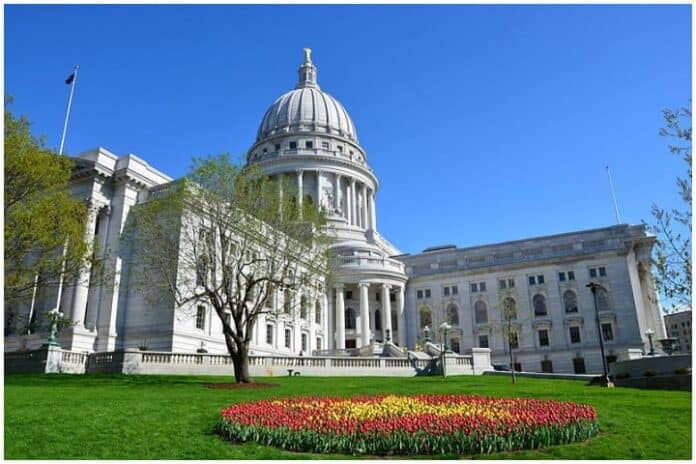Wisconsin has a divided government, and, with a Democrat in the governor’s mansion, conservatives were not going to get everything they wanted. However, there are several aspects of the new Wisconsin state budget bill that conservatives will appreciate.
The state budget bill passed in the early morning hours of July 3 with a few Republican defections and Democratic votes. This list was first posted by state Rep. Jim Piwowarczyk (R-Hubertus), who is the co-founder of Wisconsin Right Now.
“State budgets during divided government are a true test of compromise, and today’s vote reflects that. I was proud to vote for a state budget today that delivers conservative, manageable cost-of-living increases of 3.5% annually in ongoing funding to essential operations in our state, while also delivering a permanent tax cut to you, the taxpayer,” wrote state Rep. Jerry O’Conner (R-Fond du Lac).
“This week, legislative leaders and the Governor finalized a forward-thinking 2025-2027 state budget that delivers substantial tax relief and critical reforms. With nearly $1.5 billion in tax cuts, this budget puts money back into the pockets of Wisconsinites, easing the burden on families and businesses in Outagamie and Waupaca counties. It’s a significant step toward a stronger, more affordable Wisconsin,” said state Rep. Dave Murphy (R-Greenville).
Some of the conservative wins:
-Cuts over 300 total positions in state government. Additionally, the budget will maintain the position cap on UW System employees. This is about 1,200 positions less than proposed by Governor Evers.
-Reduces taxes on Wisconsin residents by nearly $1.5 billion. This includes the elimination of an entire tax by eliminating taxes on natural gas and electricity.
-Blocks over $3.7 billion in tax hikes. Eliminated Governor Evers’ proposed 9.8% income tax bracket.
-Bonds are less than those proposed by Governor Evers. Bonding in the capital budget will be less than half of the bonding proposed by Governor Evers.
-Eliminates positions and funding associated with the Office of Environmental Justice and the Office of Clean Energy and Sustainability. The Legislature has denied funding and positions associated with these offices, but Governor Evers reallocated existing resources for these wasteful offices.
-Creates a new program that essentially extends the school choice program to four-year-old kindergarten.
-Achieves significant reforms for our child care community to improve accessibility of child care in Wisconsin.
-Creates a workers’ compensation fee schedule. This reform has been pursued by the business community for years and will save significant money in Wisconsin.
-Cuts the Department of Public Instruction’s general program operations appropriation by 10%.
-Removes $8M annually from the UW System’s block grants; although not specified, this funding is associated with the money allocated to Wisconsin Public Media.
-Eliminates the ability for state agencies to pay out compensatory time to employees.
-Blocks attacks on Second Amendment rights.
-Blocks welfare expansion and the elimination of drug-testing and work requirements for public assistance.
-Prevents the creation of a state-based health insurance marketplace.
-Retains successful conservative reforms such as Act 10 provisions, right-to-work, while preventing the reinstatement of prevailing-wage.
-Blocks resident tuition for undocumented individuals.
-Blocks the executive’s attack on important legislative oversight.
-Eliminates Governor Evers’ climate change initiatives.
-Removes automatic voter registration and decreases residency requirements from 28 days to 10 days for voting.
-Removes provisions relating to the implementation of gender-neutral terminology.
-Stops attacks on school choice, such as freezes on enrollment in school choice programs.
-Blocks the use of eminent domain for bike and pedestrian paths.
-Eliminates the mandate of FMLA paid for by private employers, and adds paid family leave for all state and UW employees.
-Removes countless indirect tax hikes, such as allowing counties and larger municipalities the ability to raise sales taxes and the creation of regional transit authorities.
-Blocks the Tuition Promise Grant program to cover tuition and segregated fees for certain students at UW System institutions.
-Blocks state funding for the Office of Violence Prevention.
-Blocks unprecedented regulations on Wisconsin businesses.
Some other quotes from legislators:
Assembly Majority Leader Tyler August (R-Walworth) said: “In a major victory for Wisconsin taxpayers, the Assembly passed a budget that reaffirms our commitment to eliminating wasteful spending and continuing to provide meaningful tax relief to the hardworking residents of Wisconsin. This budget reflects the promises I made when I ran for office: to lower taxes and reduce the size of government.
Rep. Amanda Nedweski (R–Pleasant Prairie) said: “This budget puts Wisconsin families first by addressing the issues that they care about most,” said Nedweski. “Legislative Republicans prioritized passing a $1.5 billion tax cut to help middle-class families combat Governor Evers’ 400-year property tax increase. We also secured a historic $500 million investment in special education to ensure students with the greatest needs receive the services they deserve. Additionally, we cut red tape in the child care industry, giving parents more options that align with their values.”
Representative Shannon Zimmerman (R–River Falls) said: “It has been an honor to again work with my colleagues on the Joint Committee on Finance to
create a budget that delivers on funding important priorities while also reducing taxes. This budget reflects the concerns I’ve heard from constituents in my district. We managed to negotiate with Governor Evers in good faith to pass a budget that works for all Wisconsinites.”
Republican state Sen. Van Wanggaard said: ““I live in the real world. Wishing Republicans held all the power in Madison and acting like it
doesn’t make it so. We need to deal with the hand we’re dealt. We have a Democratic governor, and some Republicans who refused to negotiate in good faith. Like any budget, there are things included that I wish weren’t, and things I wished to be included that aren’t. But, overall, this budget is the realization of many long-term goals and concrete wins for Milwaukee and Racine County.”
State Senator Dan Feyen (R-Fond du Lac) released the following statement: “With a divided state government as we currently have, it’s obvious that no one will get everything they want in the state budget. On the campaign trail, I consistently held that one of my top requirements in a budget I could support would be a meaningful tax cut for my hardworking constituents, which this budget delivers, through over $1.4 billion in tax relief.”
Senator Eric Wimberger (R-Oconto) said: “From the start, I’ve advocated for a state budget that funds our infrastructure needs, lowers our tax burden, and delivers real relief for families across Wisconsin. I’m proud to serve on the budget-writing committee, and I’ve worked hard to secure millions of dollars for transformational projects that will benefit all of Northeast Wisconsin.”
Sen. Rachael Cabral-Guevara said: “No budget is perfect, but the one I voted for today will ensure we live within our means while providing necessary investments in special education, health care, and our community. This budget will provide a lot of good for Wisconsinites while also being fiscally responsible, cutting taxes for folks by over 1.3 billion dollars, and providing critical support to care for folks who want to stay at home through private duty nursing,” said Sen. Cabral-Guevara.
Wisconsin Senate President Mary Felzkowski voted “no” on the 2025-27 Wisconsin Biennial Budget.
“This budget is balanced on the back of the federal government that is $36 trillion in debt, using a little-known gimmick: the Hospital Assessment and Access Payments provision. Governor Doyle was the first to use this provision in Wisconsin to help balance the budget due to the financial stress of the Great Recession. Now, the federal government has realized that this gimmick is unsustainable and is cracking down on states abusing this program. This is why Governor Evers and Republican Legislative Leaders are rushing to complete the state budget before President Trump signs his “One Big Beautiful Bill” into law,” she wrote. “The provision works like this: hospitals pay in just over $419 million per year (per statutes), and these funds are then used to leverage additional federal dollars. Those additional dollars go back to the hospitals. Hospitals receive $679.9 million (netting $260.5 million), and the state receives $150.4 million.”
You can read additional press releases, including from legislative Democrats, here.





![Mandela Barnes Said ‘Reducing Prison Populations is Now Sexy’ [VIDEO] Reducing Prison Populations is Now Sexy](https://www.wisconsinrightnow.com/wp-content/uploads/2022/09/Collage-Maker-14-Sep-2022-11.44-AM-356x220.jpg)







![Author Exposes the Tragic Realities of the 2020 Riots & the ‘Gaslighting of America’ [REVIEW] julio roses](https://www.wisconsinrightnow.com/wp-content/uploads/2025/11/MixCollage-21-Nov-2025-02-08-PM-8145-356x220.jpg)



















